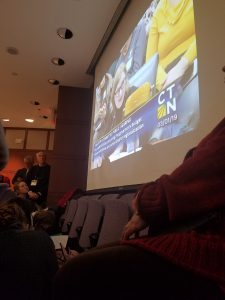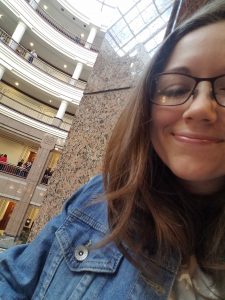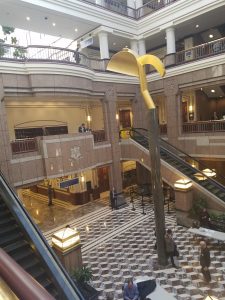On Friday March first, I went to the one o’clock education appropriations meeting. The public hearing was held in three parts: the first hour was with the commissioner and public officials, the second hour was students speaking, and the third hour was with the general public and public officials. The bills discussed were S.B. No. 874, H.B. No. 7150, proposed S.B. No. 457, and proposed S.B. No. 738. To hold all of the spectators in attendance, three overflow rooms were designated and all four rooms, in total, were packed. There were adults, political workers, kids, etc. and the majoring were wearing stickers saying: “hands off our schools” and “no redistricting”. There was a sense of community in the rooms as many of the kids were there to speak in front of the panel.
The hearing began with Commissioner Diana Wentzel introducing Governor Lamont’s proposed budget bill and she stated that “education is the opportunity engine of our young people.” She included information about there being less than 200 independent school districts, the bills encouraging shared services, and that they were in favor of incentivized regionalization, not forced regionalization. Wentzel stressed that there was increased funding to education sharing grants including roughly 400 hundred schools across 33 districts in the state on Connecticut.
Representative Bolinsky spoke in concerns of transportation: “how do we address school transportation for private and parochial schools?” The panel responded that there was no change from fiscal 19 to private school transportation. This was one of the first questions asked in the hearing and I found it to be a little odd considering the majority of the remainder of the first hour concerned public schools, home schoolers, shared services (including superintendents), and teacher salary. The meeting continued with Gail Lavielle (R) (143rd district) highlighting the “use of the word redistricting at least twice” in the bill even though it was supposed to be about shared services. Melissa McCaw (Secretary) (OPM) responded that there was not a great answer to her inquiry and there needs to be “further dialogue between now and June 5th.”
In another part of the meeting, Wentzel talked about how the smaller districts composed of either one or two schools (totaling 74 districts) were “elementary only…and unable to offer full compliments of k-12 curriculums…with fiscally unavailable districts.” She goes on the say that the students in these districts are “unable to keep up and are pushed into special programs as a result.”
One of the most poignant parts of the hearing was when Noreen Kokoruda asked about the “proposal to cover teacher’s pension for one district school by the board of education, but for a multi-school districts it will be done by the towns.” McCaw responded that it was a “challenge in [determining] how to allocate those costs.” This discussion ended up being an odd segway into a question by another representative asking about homeschooling and the steps needed to get the curriculum. Wentzel responded with information about how the families are supposed to talk to the public school to get the curriculum and resources supplies including ones for college preparation. After this, there was an eruption of laughter among the spectators saying that none of that was true and wondering how she could say that. Even Douglas McCroy laughed before continuing on with the hearing.
Overall, the hearing was riveting and many questions concerning the new bill were asked, and the answers were not very comprehensive. There was a slight pick-up before I left when the kids began to give their testimonies. It was a vital meeting for the public school system, and I hope that the government really listened to the people.


